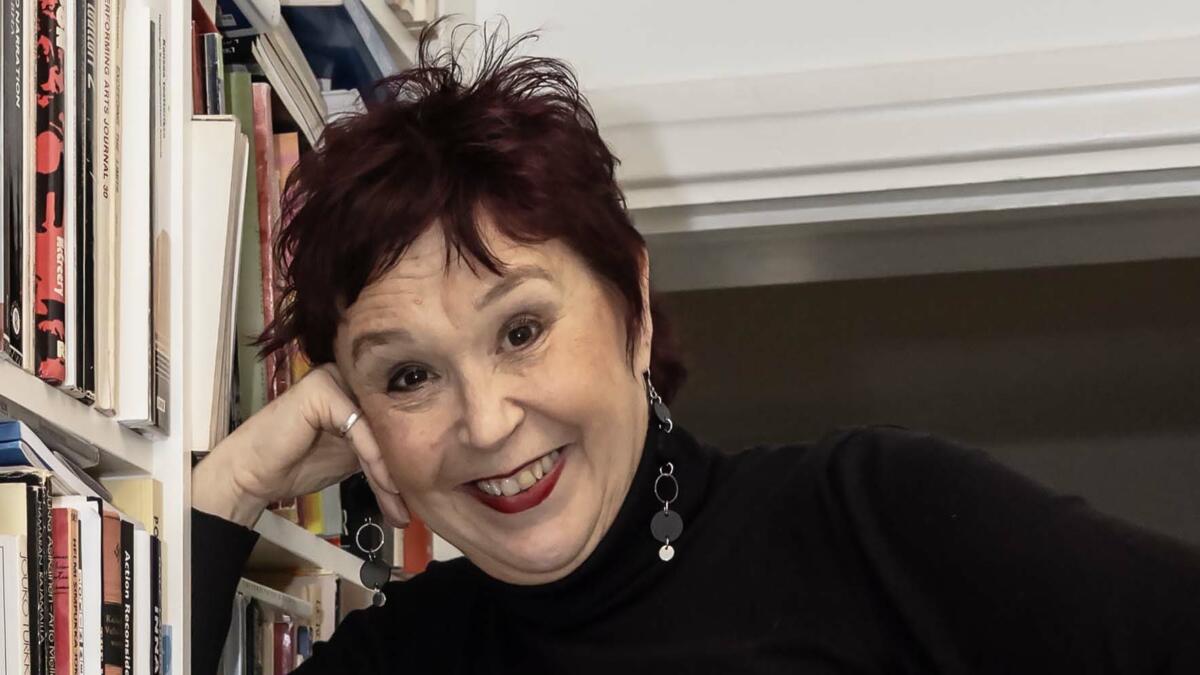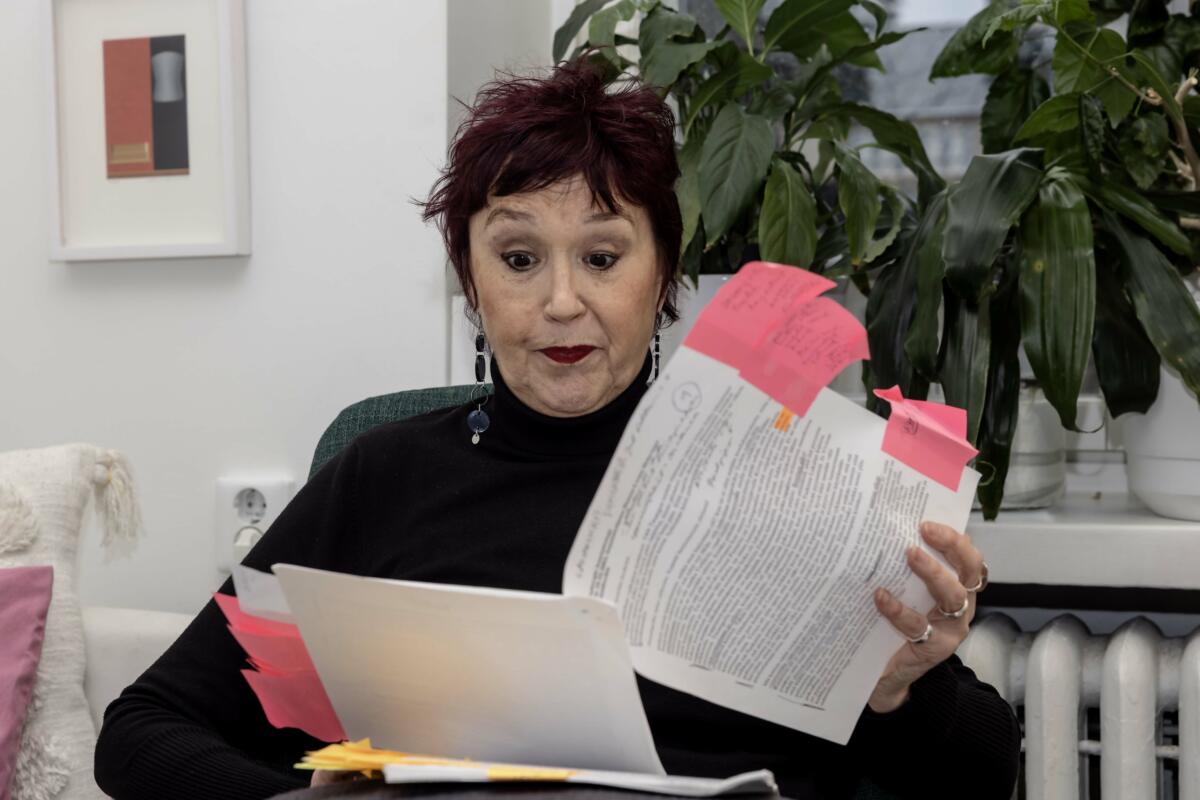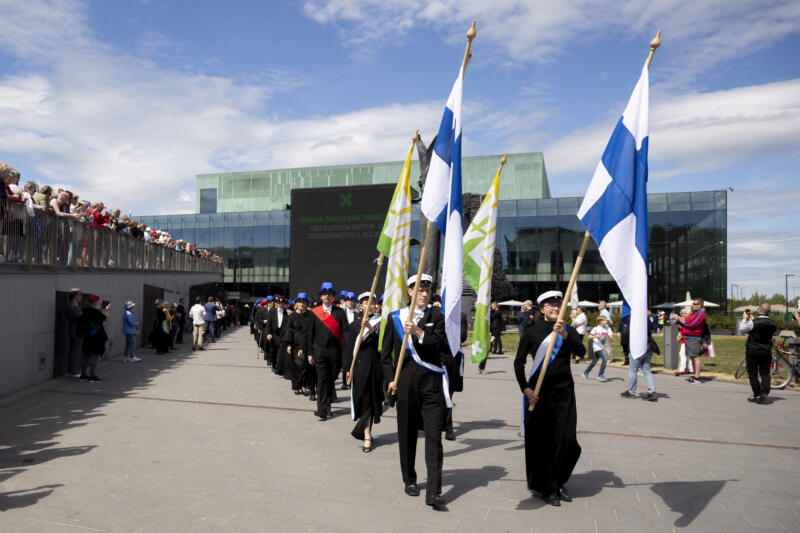Honorary doctor Hanna Helavuori: Hot or cold – never lukewarm
Hanna Helavuori, one of the recipients of honorary doctorates at Uniarts Helsinki, has done an enormous amount of work for the Finnish theatre scene – out of pure joy, sheer delight in creating and love for theatre.

In 1972, the Royal Shakespeare Company visited the Finnish National Theatre. It performed a stage adaptation of A Midsummer Night’s Dream directed by theatre legend Peter Brook.
“That was a big deal. We discussed the original text in my school’s English class, and a big group of pupils travelled from Pori to Helsinki to watch the performance,” reminisces Hanna Helavuori, a freelance writer, researcher and critic who will be awarded the title of honorary doctor in Uniarts Helsinki’s conferment ceremony in August.
The trip to Helsinki and back took some time, and the magical play itself was nearly three hours long.
“It was the perfect alibi,” Helavuori says and starts to laugh.
“My friend and I skipped the whole trip and ran wild for the whole evening in Pori!”
Power of having free rein
After that, Helavuori has hardly missed any major events of the theatre world. Her almost entire forty-year career is linked to theatre, one way or another. For a long time, Helavuori worked at the Theatre Museum, for example, and later also as the director of Theatre Info Finland TINFO.
“In these both jobs, I was able to freely live out my calling together with others,” Helavuori says.
During Helavuori’s leadership, the Theatre Museum developed into a vibrant museum – a fascinating, communal platform presenting both history and present of the theatre field. The museum showcased the work of visual artists, sound designers, actors and researchers alike.
The museum also had a stage of its own for performances and workshops. Helavuori herself led retreats for Theatre Academy students in the museum facilities as part of their theatre history studies. In 2001, the museum was awarded the Council of Europe Museum Prize.
“It was a wonderful job, positively a realm of freedom. The success was thanks to the museum staff and the Foundation of the Theatre Museum, which trusted and encouraged us and gave us the permission to do something totally new,” Helavuori says.
As the director of Tinfo, Helavuori developed the centre’s information production, communications and compilation of statistics. Almost by coincidence, she started writing brief theatre reviews and commented on other topical matters in the centre’s newsletter. There were avid readers of these texts all over Finland.
Helavuori says that she wrote Merkintöjä työpäiväkirjasta (Notes from a Work Diary in English) out of pure joy of reflecting and writing outside of her working hours.
“The newsletter was sent out on Thursdays, so each Wednesday, I would sit down and write until late at night based on my notes,” she explains.
Helavuori’s curriculum vitae also includes teaching the history of contemporary theatre at the Theatre Academy. She says that Uniarts Helsinki was a valuable place for peer learning.
“Exchanging views with gifted students and being in the audience watching students’ works and reading their texts built up my own understanding.”
Helavuori criticises the Finnish school system for its unequal arts education that does not give children and teenagers an equal readiness to interpret and create art. It is in no way guaranteed that these skills are acquired at home, and art and other related hobbies are often the privilege of well-off people with higher education degrees.
“I’m afraid that this will narrow down the opportunities of certain groups that apply to Uniarts Helsinki and have an impact on not only recruitment in the arts sector but also the future of art in general,” Helavuori says.
She finds that the standard of higher education in the arts is good, however.
“Sometimes, what worries me more is the kind of theatre scene that awaits these budding talents when it’s time to find employment. Will people recognise the value of artists and art anymore in the future?”
Striking a deep chord
Initially, Helavuori planned a career as a Finnish language teacher and went to study at the University of Turku. Helavuori has professor Irmeli Niemi to thank for her ending up in the business of theatre, as it was Niemiwho encouraged Helavuori during her student years and tailored literature examinations to include sections on theatre-related theories, for example.
“Immu, too, was interested in live theatre, and she had written her dissertation on Maria Jotuni’splays and had been involved in preparing national art policies. Through her example, she showed that career options didn’t have to be limited to academic work and research,” Helavuori says.
Helavuori had the chance to see performances already as a child in Pori, and she developed a tremendous interest in theatre back then. Later, she wrote her master’s thesis about the history of the Pori Workers’ Theatre.
“The theatre in Pori opened up outwards to society, it was dynamic and also attracted young people. Nobody could have dragged me on stage, but I loved to be in the audience.”
When Helavuori was in upper secondary school, her class would go see performances produced by the Turku City Theatre. An adaptation of Seitsemän veljestä directed by Kalle Holmberg made a particular impression on her, and the feelings it conveyed struck a deep chord within her.
“Decades later, my friend reminisced that after that performance I had raved about the bustle and movement that I had just witnessed like a madwoman.”
Helavuori says, in fact, that she is never able to watch a performance with a cool, analytical mindset.
“Being in the audience, I feel like I’m a partner in a love-filled act who has to be exposed to the performance and give themselves to it as much as the performers do,” she explains.
“In his time, Kalle Holmberg often quoted the Bible saying that be hot or cold, but don’t be lukewarm. I think it’s a good guideline to not only theatre professionals but others, too.”
Art needs mediators
Helavuori’s style of writing about the performances she sees is always positive. She does not distinguish a right or wrong way to make art, and instead, she tries to see each performance for what they are, as something important and meaningful for their makers.
Helavuori’s critiques encapsulate her wide perspective, vast knowledge of history and extensive recollection of experiences to use when discovering and forging both old and new connections.
“To me, writing about theatre is about giving recognition and about showing loving encouragement for theatre-makers to go and make and for new audiences to go and see,” Helavuori says.
Through her writing, she hopes to contribute to the field of art criticism, which has become more and more of a marginal scene in recent years. For example, journalists of culture pages have lost their jobs and entire newspapers have ceased publication altogether. Helavuori finds that the work of many people in various fields in the arts is in jeopardy of passing into oblivion.
“Art needs mediators – people who not just talk about it but delve deeper into it, too,” Helavuori says.
“More entertainment-centred programmes are given coverage, while performances representing the margin get hardly any. Art discourse has withered. Freelance critics and cultural journalists are paid poorly, and it may be difficult to get work offers in the first place.”

New audiences in the Finnish theatre scene
The way Helavuori sees it, the theatre scene with its diverse range of colours and voices is fodder for democracy and a crucial part of civil society.
“Theatre is part of critical thinking, and it teaches us ways to exist and co-exist. Who and what we see on stage is a reflection of the Finnish society and its ability to accept people as part of its community,” she says.
The Finnish theatre has traditionally been strongly linked to the people, which is likely the reason why Finns have visited the theatre often in previous decades.
“If we want to preserve this connection to the people, we can’t create theatre for the same audience as we did twenty years ago,” Helavuori says.
“We need aesthetics and thoughts that touch new generations and diverse audiences with immigrant backgrounds, for example. Why else would they come to theatre?”
Helavuori praises live art for boldly shaking up concepts like gender binarity and introducing more diverse representation.
“Then again, many of these things still happen in the margins, on the peripheries of the arts, which people aren’t necessarily even aware of and therefore don’t go and see because nobody tells them about these things,” she says.
At the moment, Helavuori says she is privileged to be able to continue active work and to go see performances, spend time with her thoughts and then write – with freedom and without hurry.
“I find that I’m practically immersed in art. There’s no reason to give it up.”
Text: Elli Collan
Uniarts Helsinki conferment event, the ceremonial conclusion of university studies, will be held in Helsinki from 16 to 18 August 2024. The ceremony will feature the conferment of degrees on master’s graduates and doctors from the university’s academies. Additionally, honorary doctorates will be conferred on eight individuals who represent Finnish or international pioneers and influential figures in their fields and who have advocated for arts education or advanced the societal role and significance of the arts.
The honorary doctors have been selected by the boards of the Academy of Fine Arts, Sibelius Academy and Theatre Academy and the university board of the University of the Arts Helsinki. Being conferred an honorary doctorate is the highest recognition bestowed by the university.
